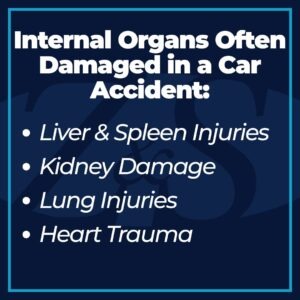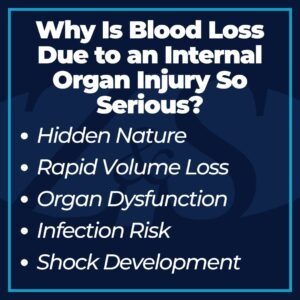
Organ damage represents one of the most serious consequences of accidents and medical malpractice in Maryland. When these severe injuries occur due to someone else’s negligence, victims often face overwhelming medical expenses, lost income, and significant pain and suffering. These catastrophic injuries require specialized legal representation.
At Zirkin & Schmerling, our personal injury lawyers understand the life-altering impact of catastrophic injuries to the organs. Whether you’ve suffered harm in truck accidents, pedestrian accidents, workplace accidents, through medical negligence, or are a car accident victim, our team is prepared to fight for your rights and help you seek compensation.
Organ damage can be particularly challenging because symptoms may not appear immediately, leading to delayed diagnosis and treatment. This delay can significantly complicate your personal injury claim.
If you or a loved one has suffered organ damage in Maryland, don’t face this difficult time alone. An experienced injury lawyer can make all the difference in these complex cases. Our personal injury law firm offers a free consultation to discuss your situation and explore your options for seeking fair compensation. Call us at 410-753-4611.
What Is Internal Organ Damage?
Organ damage involves injury to vital organs within the body’s cavities, often resulting from direct trauma or penetrating injuries. These injuries can range from minor contusions to severe, life-threatening damage that may require emergency surgery or long-term medical care.
What makes organ damage particularly dangerous is that it may not be immediately apparent. Unlike visible injuries such as broken bones or lacerations, damage to the organs can progress silently, with symptoms developing hours or even days after the initial trauma. This delayed presentation makes prompt medical evaluation crucial after any significant accident.
Internal Organs Often Damaged in a Car Accident
Motor vehicle accidents are among the leading causes of organ damage in Maryland.

The sudden deceleration and impact forces in auto accidents can cause various internal injuries:
- Liver and Spleen Injuries: The liver, located in the upper right abdomen, and the spleen, in the upper left, can suffer lacerations or rupture from the force of impact.
- Kidney Damage: Damage ranges from bruising (contusion) to complete rupture.
- Lung Injuries: Fractured ribs can puncture the lungs, leading to a pneumothorax (collapsed lung) or hemothorax (blood in the chest cavity).
- Heart Trauma: The heart can sustain damage in severe crashes, including contusions or, in extreme cases, rupture.
- Gastrointestinal Injuries: The stomach, intestines, and other digestive organs can be damaged by seatbelts or direct impact, potentially leading to internal bleeding or perforation.
- Bladder and Urinary Tract Injuries: These injuries often occur in conjunction with pelvic fractures and can require extensive surgical repair.
Understanding the mechanics of how these injuries occur and their long-term implications is crucial when pursuing a personal injury lawsuit.
Our Maryland personal injury lawyers work closely with medical experts to establish the connection between the accident and your organ damage.
Symptoms of Internal Organ Damage
Recognizing the symptoms of organ damage can be lifesaving.
If you experience any of the following after an accident, seek immediate medical attention:

- Abdominal pain or swelling
- Bruising or discoloration around the abdomen
- Nausea or vomiting
- Dizziness or fainting
- Difficulty breathing
- Low blood pressure
- Rapid heart rate
- Blood in urine or stool
- Fever
- Unexplained fatigue
Internal injuries may accompany visible trauma like broken bones, making comprehensive medical evaluation crucial. Following an accident, it’s essential to get a thorough medical evaluation, even if you initially feel fine. Not only is this crucial for your health, but records created shortly after the incident provide valuable documentation for your personal injury claim. An accurate accident report documenting the circumstances is crucial evidence.
How Internal Organ Damage Is Diagnosed
Diagnosing organ damage typically involves several steps:
- Physical Examination: Healthcare providers will check for signs of trauma such as bruising, swelling, or tenderness.
- Blood Tests: Abnormal blood values can indicate organ damage. For example, elevated liver enzymes may suggest liver injury, while blood in the urine may indicate kidney damage.
- Imaging Studies:
- Exploratory Surgery: In severe cases, emergency surgery may be necessary both to diagnose and treat internal injuries.
Our team works with medical experts to ensure your injuries are fully documented and their impact on your life is clearly presented.
Causes of Internal Injuries in a Vehicle Accident

Understanding the mechanisms of injury in motor vehicle accidents helps establish liability and the need for compensation in personal injury cases:
Blunt Force Trauma: This occurs when the body collides with parts of the vehicle interior, such as the steering wheel, dashboard, or door. This is common in car accidents, truck accidents, and pedestrian accidents.
Penetrating Injuries: These happen when objects pierce the body, directly damaging the organs. Broken glass, metal fragments, or other debris can cause penetrating injuries during a crash.
Deceleration Injuries: When a vehicle stops suddenly, the organs continue moving forward within the body, then rebound against internal structures. This movement can tear blood vessels or tissues connecting organs to the body wall.
In addition to these primary mechanisms, secondary complications such as internal bleeding or infection can cause further damage. Our Maryland personal injury attorneys have extensive experience linking these injury mechanisms to negligent driving behaviors, defective vehicle components, or unsafe road conditions. The accident report can help establish the connection between the incident and your injuries.
Life-Threatening Internal Organ Injuries
Some organ injuries present immediate life-threatening risks that require emergency care:
- Ruptured Spleen: The spleen can tear or rupture upon impact, causing rapid internal bleeding. This is a medical emergency often requiring surgical removal of the spleen.
- Liver Lacerations: As the largest solid organ, the liver is vulnerable to tearing. Severe lacerations can cause life-threatening hemorrhage.
- Aortic Tears: Damage to the aorta, the body’s main artery, can result in rapid and fatal blood loss if not immediately treated.
- Perforated Bowel: Intestinal perforations allow bacteria to enter the abdominal cavity, leading to peritonitis—a severe infection that can be fatal without prompt treatment.
- Traumatic Brain Injuries: While not strictly an organ injury, traumatic brain injuries often occur alongside organ damage and can be life-threatening.
- Spinal Cord Injuries: Trauma to the spinal cord can occur alongside organ damage in severe accidents, potentially causing partial or complete paralysis.
Even when not immediately life-threatening, organ damage can lead to significant complications, including:

- Organ failure
- Chronic pain
- Reduced organ function
- Post-traumatic stress disorder
- Infection
- Secondary injuries from extended hospital stays
In the most tragic cases, these injuries may be fatal, leading families to pursue a wrongful death claim or wrongful death lawsuit to seek justice for their loved one. These long-term consequences must be considered when calculating the value of your personal injury claim. Our team works to ensure that both immediate and future medical expenses are included in your personal injury compensation request.
Ongoing Medical Costs of Internal Organ Damage
The financial burden of organ damage and catastrophic injuries extends far beyond initial emergency care.
Victims often face substantial ongoing medical costs, including:
- Emergency room care and trauma services
- Surgical procedures
- Intensive care unit stays
- Extended hospitalization
- Rehabilitation services
- Specialized medical equipment
- Prescription medications
- Home health care
- Follow-up appointments and monitoring
- Potential future surgeries or treatments
- Mental health services for trauma and adjustment
These expenses can quickly overwhelm even well-insured individuals. Additionally, victims often experience lost wages due to the inability to work during recovery or, in severe cases, permanent disability preventing a return to previous employment. Victims with spinal cord injuries may require extensive rehabilitation and adaptive equipment.
Our Maryland personal injury law firm recognizes the importance of accounting for both current and future medical expenses in your personal injury claim.
Your Rights After an Internal Organ Injury

Insurance companies often attempt to minimize serious injury claims. As a victim of organ damage caused by someone else’s negligence in Maryland, you have specific legal rights including:
Right to Compensation: You have the right to seek financial compensation for economic damages (medical bills, lost income) and non-economic damages (pain and suffering, emotional distress).
Right to Medical Care: You have the right to receive appropriate medical treatment for your injuries, regardless of your ability to pay immediately.
Right to Legal Representation: You have the right to hire a personal injury attorney to represent your interests. Most Maryland personal injury lawyers, including our team, work on a contingency fee basis, meaning you pay nothing unless we recover compensation for you.
Right to Privacy: Your medical records and personal information are protected by privacy laws, though some information may need to be disclosed as part of your claim.
Right To File a Personal Injury Lawsuit: If fair compensation cannot be negotiated, you have the right to file a personal injury lawsuit and have your case heard in court.
It’s important to understand that insurance companies often attempt to minimize payouts for catastrophic injuries like organ damage. Having experienced personal injury lawyers on your side ensures your rights are protected throughout the legal process.
Liable Parties After Internal Organ Damage
Determining who is the liable party is a critical step in securing compensation for organ damage. Determining liability for catastrophic injuries requires thorough investigation.
Potentially liable parties may include:
- Negligent Drivers: Drivers who violate traffic laws or drive recklessly may be held liable for resulting physical injuries.
- Vehicle Manufacturers: If defective auto parts contributed to the accident or exacerbated injuries, the manufacturer may bear responsibility.
- Health Care Providers: In cases of medical malpractice or nursing home abuse, doctors, nurses, or hospitals may be liable if they failed to meet the standard of care.
- Property Owners: In premises liability cases, property owners who fail to maintain safe conditions may be responsible for serious injuries occurring on their property.
- Employers: Employers may be liable for workplace accidents, particularly if safety regulations were violated.
- Government Entities: In some cases, municipal or state governments may be liable for accidents caused by poorly maintained roads or infrastructure.
Maryland follows a contributory negligence rule, which means if you are found even partially at fault for the accident, you may be barred from recovering compensation. This strict standard makes it especially important to have skilled Maryland personal injury attorneys building your case.
Possible Statute of Limitations Extensions
In Maryland, the statute of limitations for most personal injury claims is three years from the date of the injury. However, there are circumstances where this deadline might be extended:
- Discovery Rule: If the organ damage wasn’t immediately apparent and couldn’t reasonably have been discovered right away, the statute of limitations may begin from the date the injury was discovered or should have been discovered.
- Minor Victims: If the victim is under 18, the statute of limitations typically doesn’t begin until they reach the age of majority.
- Mental Incapacity: If the victim lacks the mental capacity to pursue a claim, the statute may be tolled until capacity is restored.
- Defendant Concealment: If a defendant actively conceals their wrongdoing, the court may extend the filing deadline.
Despite these potential extensions, it’s crucial to consult with a Maryland personal injury lawyer as soon as possible after an accident. Early action allows your legal team to preserve evidence, interview witnesses while memories are fresh, and ensure compliance with all procedural requirements for your personal injury case.
Internal Organ FAQs
Why Is Blood Loss Due to an Internal Organ Injury So Serious?
Blood loss from organ injuries is particularly dangerous for several reasons:

- Hidden Nature: Unlike external bleeding, internal bleeding isn’t immediately visible, allowing significant blood loss before symptoms become apparent.
- Rapid Volume Loss: Major organs like the liver have extensive blood supply, and damage can result in rapid blood loss.
- Organ Dysfunction: Blood pooling in body cavities can compress other organs, causing additional damage.
- Infection Risk: Blood in the abdominal or chest cavity creates an environment conducive to bacterial growth.
- Shock Development: Significant blood loss can lead to hypovolemic shock—a life-threatening condition where the heart cannot pump enough blood to vital organs.
Prompt medical attention is essential when internal bleeding is suspected. The accident report and medical records documenting the timing and extent of blood loss can be crucial evidence in your personal injury lawsuit.
What Is the Maximum Compensation for Non-Economic Damages After Internal Organ Damage?
Non-economic damages compensate for intangible losses like pain, suffering, emotional injuries, and reduced quality of life.
In cases of organ damage, maximum compensation for these damages may be appropriate due to:

- Severe Pain: Organ injuries often cause extreme pain during both the acute phase and recovery.
- Long-Term Suffering: Many victims experience chronic pain, discomfort, or limitations for years after the initial injury.
- Psychological Impact: The trauma of the injury and recovery process can lead to anxiety, depression, or post-traumatic stress disorder.
- Loss of Enjoyment: Permanent damage may prevent victims from participating in activities they once enjoyed.
- Altered Body Image: Surgical scars or physical changes can affect self-esteem and body image.
Cases involving spinal cord injuries often warrant the highest compensation due to their life-altering nature. Maryland does cap non-economic damages in personal injury cases, with the exact amount adjusted annually. As of 2023, the cap was $920,000 for most personal injury cases.
What Is Loss of Consortium?
Loss of consortium refers to the negative impact an injury has on the relationship between the injured person and their spouse or family members. In organ damage cases, this can include:
- Loss of Companionship: The injured person may be unable to participate in family activities or maintain the same level of interaction with loved ones.
- Loss of Support: The injury may prevent the victim from providing the same level of emotional or practical support to family members.
- Loss of Parental Guidance: For parents with young children, the injury may limit their ability to care for and guide their children.
In Maryland, a spouse may be entitled to compensation for loss of consortium as part of a personal injury claim. This aspect of damages recognizes that serious injuries affect not just the victim but their entire family unit.
Zirkin & Schmerling: Your Internal Organ Injury Advocates

Organ damage can have devastating consequences for victims and their families. The physical pain, emotional trauma, and financial burden can be overwhelming. However, you don’t have to face these challenges alone. Our personal injury expertise has helped countless victims receive the compensation they deserve. We’re committed to helping injury victims rebuild their lives after serious accidents.
At Zirkin & Schmerling, our Maryland personal injury attorneys have extensive experience helping injury victims seek compensation for their losses. Our trial lawyers understand the complexities of catastrophic injury claims and have the resources to build strong cases against negligent parties and their insurance companies. Our team specializes in catastrophic injuries including organ damage.
Whether you’re claiming auto accidents cases or medical malpractice cases, our legal team is prepared to advocate for your rights. We work tirelessly to secure the financial compensation you need to cover medical bills, lost wages, and other damages resulting from your injuries. We know how to negotiate with insurance companies to maximize your compensation.
Contact Us Today
Don’t let the statute of limitations expire on your claim. It’s crucial to consult with a personal injury lawyer as soon as possible after an accident. Contact our personal injury attorney firm today at 410-753-4611. for a free consultation to pursue compensation. Our experienced injury lawyers are proud members of the Maryland Association for Justice and are committed to helping you through this difficult time. We’ve successfully resolved numerous personal injury cases involving internal damage.










